25th May 2014
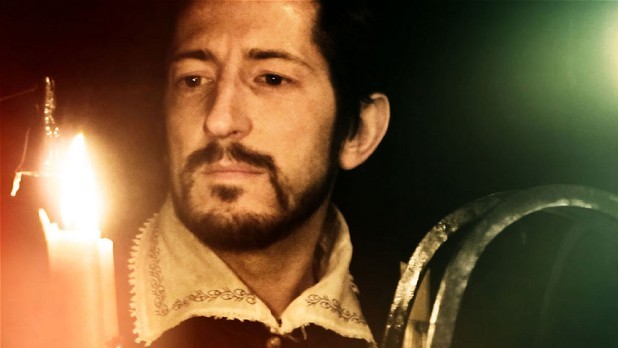
For all sorts of reasons, I’m really looking forward to tonight’s BBC Four broadcast of The Duchess of Malfi recorded at the Sam Wanamaker Playhouse. First off, John Webster’s revenge tragedy is one of my favourite plays (along with his other masterpiece The White Devil). Then there’s the fact that this is the first television broadcast of a play from a theatre for at least a decade – and the first Jacobean drama to be seen on the small screen since The Changeling back in 1993. And of course, since I am deeply involved in translating stage to screen producing the RSC’s Live from Stratford-upon-Avon broadcasts, I have a strong professional interest as well. I saw the production on stage and I plan to live-blog this evening’s broadcast. All of which meant that I was also fascinated to see James Shapiro’s curtain-raiser documentary last night, The Mysterious Mr Webster. read more »
21st May 2014
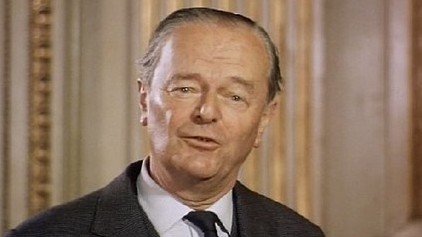
Tate Britain this week has opened the exhibition Kenneth Clark: Looking for Civilisation, which runs until 10 August. There is no sense that I can be impartial about the show, given that I contributed by curating the television extracts (which my Illuminations colleague Todd MacDonald compiled) and writing a catalogue essay about the television programmes that Clark made for ATV between 1958 and 1966. But let me say that I think it’s a completely fascinating – and beautiful – display about a profoundly influential figure in twentieth century culture.
I have long been interested in ‘K’ (as he was always known to his friends) and back in 1993 I directed a BBC documentary about his life and ideas. Twenty years on I have contributed to a new film about him, produced by Kate Misrahi and screening on BBC Two on 31 May (thoughts on that to follow). Here I want to draw together a range of resources about and responses to the exhibition, and over the coming days I will add to this as other pieces appear. I also intend to write further about the choice of extracts included in the exhibition and about the many remarkable art objects that the curators Chris Stephens and John-Paul Stonard have drawn together. read more »
20th May 2014
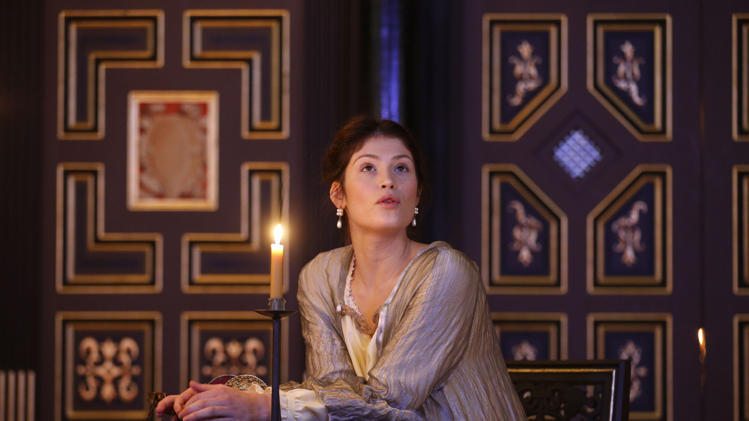
This coming Saturday BBC Television broadcasts both a documentary about the Jacobean theatre (on BBC Two, Saturday) and a recording of John Webster’s play The Duchess of Malfi (on BBC Four, Sunday) shot in the new Sam Wanamaker Playhouse. In many ways this is very good news, not least because this is the first television production of a Jacobean tragedy since The Changeling back in 1993 and the first drama presented from a theatre in at least a decade. Bravo. But let’s start with some not-quite-so-good news, and a bit of a breath-taking quote from Malfi‘s star, Gemma Arterton.
In an interview in this week’s Radio Times, she speaks about how she thinks theatre doesn’t translate well to television, and she recalls her recent appearance at the BBC shindig for Tony Hall’s announcement of a new commitment to the arts. A clip from Malfi was the supposed highlight, after which she was interviewed on stage by Alan Yentob, when she enthused about the whole experience. Except that, as she now reveals, she was far from keen on the extract. ‘I had to do that thing at the BBC,’ she tells Radio Times. ‘When they showed a clip I was mortified. And then I had to go, “Oh yes, it’s great”.’ read more »
19th May 2014
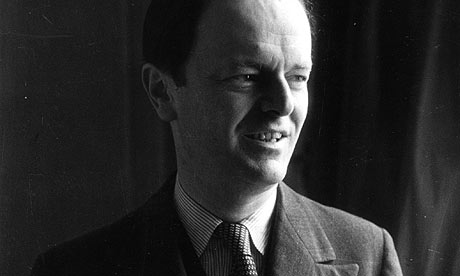
It has been just over a month since I last posted, for which I can only apologise. Not that I haven’t had things to write about. Rather too many of them, in fact. Which in part accounts for my failure to contribute anything new here in the past four weeks and more. Last Wednesday I produced the latest Live from Stratford-upon-Avon cinema broadcast of Henry IV Part I, and on Friday there was a shoot for the trailer of Two Gentlemen of Verona. I was at the Shakespeare450 conference in Paris and I have curated the current ‘Classics on TV: Edwardian Drama on the Small Screen’ at BFI Southbank. There is a screening of Don Taylor’s exceptional 1977 BBC production of Harley Granville Barker’s Waste on Tuesday evening and a half-day symposium linked to the season on Friday. And today was the press day for Kenneth Clark: Looking for Civilisation at Tate Britain (that’s the man himself, above), which I have had a hand in putting together and for which I have written a catalogue essay. These events – and more – now deserve some reflections, which is what I am to provide over the coming days…
16th April 2014
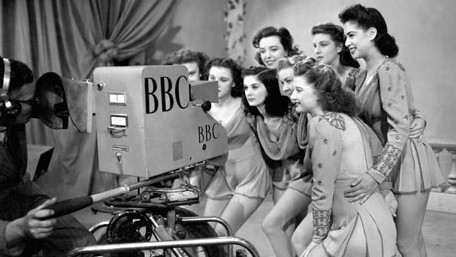
British Pathé has just published a wealth of new material on its wonderful YouTube channel (there is more about this from The Drum), and among the delights (only 5 views so far) is a newsreel spot about the return of the BBC television service after the second world war. The service, which had been operating since November 1936 from two small studios at Alexandra Palace (for more, go here and here), shut down when war was declared in September 1939. Although radio remained the BBC’s main focus in the early years of peace, television started again to broadcast the victory parade celebrations on 7 June 1946. This ‘exclusive’ Pathe report, which I’d not seen before, shows a rehearsal for an early broadcast with The Windmill Girls (also in the photograph above)- and it’s fascinating in all sorts of ways.
Let’s put to one side the objectifying male gaze that is shared by the television set-up and the newsreel camera. Although of course it’s interesting to see that this production context is an almost exclusively male world. A woman pianist tickles the ivories just out of shot, much as music was made on the earliest silent film sets, and next to her is a watchful companion. But otherwise all of the work is being done by men.
Traces of early television are rare (there are no recordings of full programmes until 1953), and this brief clip offers one of the best records of what making television involved in the early years of the medium. Note how small Studio B is, how basic is the background settings, how tightly grouped are the three cameras, and how the caption is a painted board which one of the cameras reveals before turning towards the action. Incidentally, the producer calling the shots is Cecil Madden, the BBC’s first head of television planning.
10th April 2014
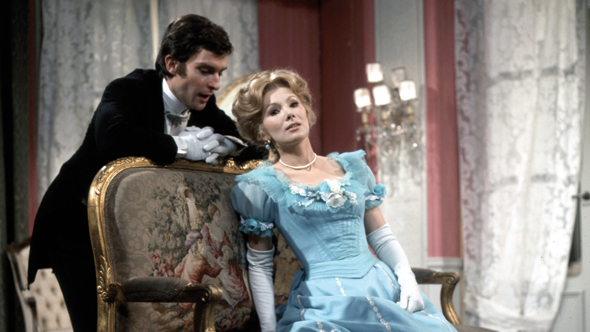
Following on from the successful Screen Plays ‘Classics on TV’ seasons ‘Greek Tragedy on the Small Screen’ (June 2012) and ‘Jacobean Tragedy on the Small Screen’ (March-April 2013), the project is delighted once again to be working with BFI Southbank. In May ‘Edwardian Drama on the Small Screen’ will present six programmes of television productions of plays written between the 1890s and the First World War. The season, which I have curated, includes notable productions of plays by Oscar Wilde (including An Ideal Husband, above), Harley Granville-Barker, George Bernard Shaw, John Galsworthy, J. M. Synge and D. H. Lawrence.
In addition, on the afternoon of Friday 23 May at BFI Southbank we are organising a symposium to explore some of the issues raised by these productions, and we are delighted that Dr Billy Smart will open this with a keynote lecture. Further details of the symposium and the programmes will follow, but here is a first look at the productions to be screened. Public booking has just opened at BFI Southbank online, and full details of the programme are below. read more »
8th April 2014
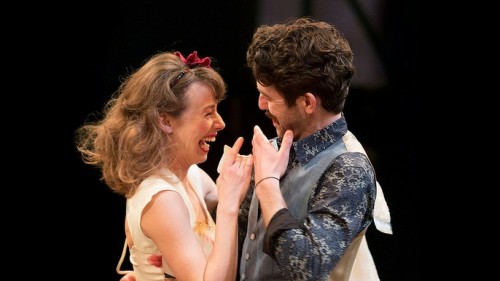
There’s something a bit superfluous and a bit naive and a bit daft about this post. But after last night and this afternoon I just want to express how much at present I love the theatre. Of course I am deeply involved with the Royal Shakespeare Company and the thrilling and thoughtful and hilarious pair of Henry IV productions (coming soon to cinemas on 14 May and 18 June). But I want here to hymn two other productions that have excited me and moved me and provoked me and prompted tears from me over the past twenty-four hours. One is A View from the Bridge by Arthur Miller, directed by Ivo van Hove (the link is to an excellent Guardian backgrounder) and still in previews at the Young Vic (until 7 June). The other is Much Ado About Nothing which is directed by Maria Aberg and has just opened at the Royal ExchangeTheatre, Manchester (until 3 May, above). Both, in their different ways, left me touched with wonder. read more »
6th April 2014
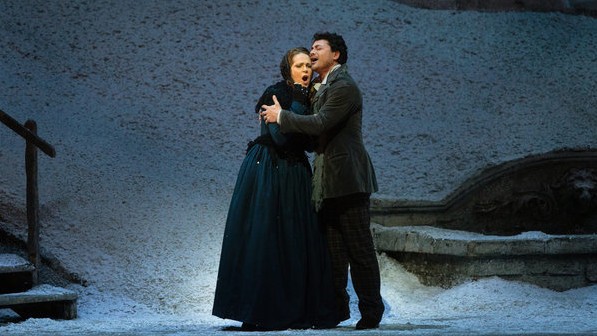
To Clapham Picturehouse for Saturday night’s Metropolitan Opera Live in HD broadcast of Puccini’s La bohème. And “live” it most certainly was, for only around five hours earlier soprano Kristine Opolais replaced flu-stricken Anita Hartig in the main role of Mimi. Host Joyce DiDonato mentioned this in her opening remarks and then the Met’s general manager Peter Gelb went out in front of the curtain to explain the change to the house and, although he made no mention of the cameras, to the rest of the world. What made the occasion all the more remarkable was that Ms Opolais had debuted in the title role of Madame Butterfly just the previous night. The soprano went to sleep at 5am and was woken with Gelb’s request some two and a half hours later, as the New York Times reports. She acquitted herself thrillingly well, making it all rather extraordinary. And for those of us interested in live cinema the broadcast had several other notable aspects. read more »
23rd March 2014
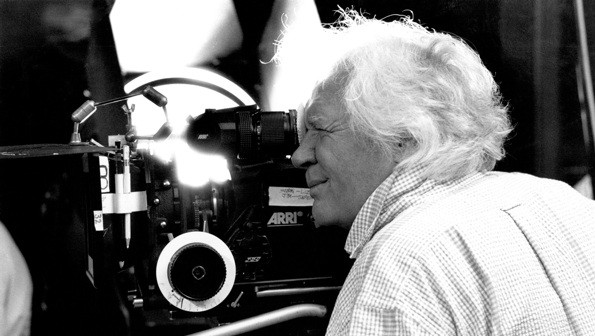
Every conference is a curate’s egg, and you always hope that the good parts make up (and more) for those that are less so. A two-day gathering in Brussels this week dedicated to the films of Ken Russell (above, on the set of Tommy, 1975) had a very decent tally of the good, and at the same time was curiouser than most such events. Taking part in Imagining the Past: Ken Russell, Biography and the Art of Making History were scholars and academics along with some like editor Roger Crittenden who had worked with Ken Russell in the 1960s and ’70s. Present too was Russell’s indefatigable biographer Paul Sutton, who is one book into a projected five-volume ‘Life’ (he it was who suggested the comparison with James Boswell’s life of the good Dr Johnson). And then there was the filmmaker’s widow, the delightful Lisi Tribble Russell (@awhitetable). All of which made for a significantly more diverse discourse than academia usually accommodates. read more »
6th March 2014
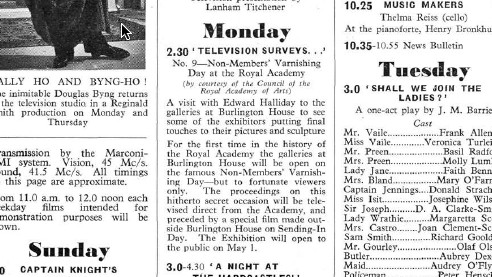
Remarkably, astonishingly, the image agency Getty Images has announced a new initiative to allow the embedding of many of its photographs for non-commercial use in blogs (like this one) and social media channels. A simple new embed tool permits the legal use of more than 35 million images as long as the attribution is included along with a link back to Getty for commercial licensing.
This feels like a game-changing project and I want to reflect on it further in a future post. But I thought to mark the news I would highlight just one image from the Getty millions. Browsing the site, and with my current interests in early television and the arts, I found the glorious shot below of a pre-war television broadcast from the Royal Academy. Getty currently has it catalogued in this way:
circa 1939: A BBC television crew filming artist A K Lawrence varnishing a painting of Queen Elizabeth and her troops at the Royal Academy, Burlington House, London. (Photo by Topical Press Agency/Getty Images)
I am fairly sure that in fact it relates to the broadcast titled Television Surveys… No 9 at 2.30pm on 24 April 1939. The Radio Times billing is above, and this describes the programme as ‘a visit with Edward Halliday to the galleries at Burlington House to see some of the exhibitors putting final touches to their pictures and sculpture.’ Halliday (1902-1984) was primarily a portrait painter – and you can find 79 images of his work at Your Paintings here. A. K. Lawrence (1893-1975) had been elected as a Royal Academician the year before the broadcast – and there are 33 Your Paintings canvases by him here, including Queen Elizabeth I at Tilbury, 1588, which you can see in the photograph. This huge canvas is apparently now in the collection of Essex County Council – I wonder if it’s on show anywhere.









